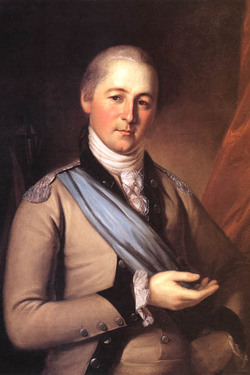Major General Joseph Bloomfield
Original Member, admitted 1783

Major General Joseph Bloomfield
2nd President of the New Jersey Society 1808-1823
In office
1793 — 1808
| Preceded by | David Forman |
| Succeeded by | John Noble Cumming |
In office
1808 — 1823
| Preceded by | Elias Dayton |
| Succeeded by | Aaron Ogden |
Born at Woodbridge, New Jersey in 1753, Joseph Bloomfield studied law with Cortlandt Skinner, the attorney general of the province, and was authorized to practice law in November, 1774. He took up residence in Bridgeton and began practicing law in February, 1775. Only two months later, news of the Battle of Lexington and Concord spread across the colonies, and Bloomfield began his military career as a sergeant of militia in the western part of Cumberland county. On the election of field officers of the Cumberland militia, June 13th of 1775, he was chosen adjutant, and on October 9th was chosen first lieutenant of another company of militia.
He was appointed February 7, 1776, as captain in the Third Battalion of troops raised for the Continental army in New Jersey. Capain. Bloomfield was promoted major of the Third Battalion November 28, 1776, and also appointed judge advocate of the northern army during the same month. He continued in the army until October 28, 1778, when he resigned, having been elected clerk of the Assembly of New Jersey on the preceding day, and having been wounded at Brandywine little more than a month prior.
Shortly after he resigned from the army he married Mary McIlvaine of Burlington, where he took up his residence, residing there during the remainder of his life, and serving as the city’s mayor for several years. He was, additionally, a general of the militia of the State, and commanded a brigade of militia, which took part in suppressing the Whiskey Rebellion in 1794.
In the war of 1812 he was appointed a brigadier-general by President Madison, and commanded a brigade stationed at Sackett’s Harbor, N. Y., and a part of his brigade, under the command of Gen. Pike, crossed into Canada and made an attack on Fort George, but was unsuccessful, Gen. Pike being killed by the explosion of the magazine. He afterwards was in command of the military district whose headquarters was at Philadelphia, and remained in service until the close of the war in 1815.
In the fall of 1816, Gen. Bloomfield was elected to Congress on a general ticket by the Democrats, and Re-elected in 1818. He was chairman of the Committee on Revolutionary Claims, and introduced the bill granting pensions to the survivors of that struggle and to the surviving widows of those deceased.
After he settled at Burlington, he was a member of and president of the “New Jersey Society for the Abolition of Slavery,” a society whose efforts were focused on ameliorating the condition of the slaves, and the cultivation of a public sentiment in favor of its abolition. He was elected a trustee of Princeton College in 1783, but resigned when he was elected Governor, and in 1819 was again elected, and held the position until his death.
He died in Burlington, October 3, 1823, and on his tomb is inscribed, “A soldier of the Revolution; late Governor of New Jersey; a General in the Army of the United States; he closed a life of probity, benevolence, and public service, in the seventieth year of his age.”
